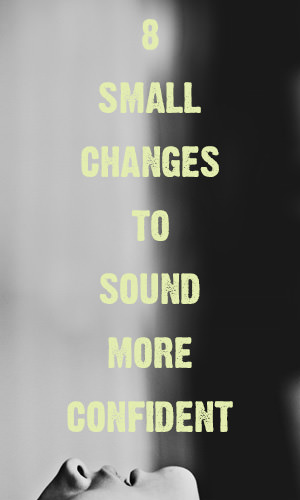
8 Small Changes To Sound More Confident

Posted on 18 Apr, 2021

You can have the best ideas in the world, but unless you also have confidence and conviction when you say them, you might as well be speaking to a brick wall. We generally like to be heard, so we reached out to vocal coaches and public speaking experts to find the simple changes we can make to get people to listen up.
 1. Slow down.
1. Slow down.
This advice seems obvious until you realize how unnatural if feels for most of us to speak slowly, says Matt Farnsworth, a voice coach and owner of Matt Farnsworth Vocal Studios. Even when you feel like you're speaking at a snail's pace, chances are you sound totally normal to the rest of the people in the room. We tend to rush our speech when we're nervous, and frustratingly, that's usually the time we're trying to get something important across. Slowing down can also help cut out filler words ("um" and "like") that undermine authority with the sound of uncertainty.
 2. Remember to breathe.
2. Remember to breathe.
Your voice is just like any other wind instrument: If you don't give it air, it stops working, Farnsworth says. Pay attention to someone who's in a panic, and you'll notice their chest will be heaving. Breathing slowly and calmly will have the opposite effect, keeping you calm, says Justin Stoney, a voice teacher and founder of New York Vocal Coaching.
3. Stand up straight.
Good posture signals a sense of poise and certainty. That same good posture can do wonders for making you sound more confident, says Dr. Laura Sicola, a leadership communication expert and founder of Vocal Impact Productions.  Standing (or sitting) up straight gives your lungs the chance to fill fully with air, which helps you avoid the dreaded vocal fry, where your voice cracks on the way out (à la Britney Spears crooning "Oh baby, baby" in "... Baby One More Time").
Standing (or sitting) up straight gives your lungs the chance to fill fully with air, which helps you avoid the dreaded vocal fry, where your voice cracks on the way out (à la Britney Spears crooning "Oh baby, baby" in "... Baby One More Time").
If soldier-like posture doesn't sound sustainable, here's a quick fix: Keep your sternum—the area at the base of your chest—up, Stoney says. "It also makes us look emotionally more vulnerable, in a good sense," he adds. Manipulation noted.
 4. End on a downbeat.
4. End on a downbeat.
Upspeak—the phenomenon where people end sentences in a higher register that sounds like they're asking a question—and vocal fry happen in both men and women (but women are more often criticized for it), Sicola says. The two speech issues make speakers sound like they're afraid of getting cut off, unsure of what they're saying, or in need of validation. That's not exactly the vibe we're looking to project, so Sicola says we should stop, assert ourselves, and say every statement like we mean it. Take a breath when you need it, and at the end of your point, create a vocal period by letting your pitch drop.
 5. Rehearse, but don't sound like it.
5. Rehearse, but don't sound like it.
True confidence comes from that sweet spot of knowing what you want to talk about but not rehearsing to the point where you sound like you're reading a script. If you're going into a high-tension situation, like asking for a raise or asking someone on a date, run through the scenario in your head a couple of times, Stoney says.
 "You want to know: Here’s what I want, here’s the reasons that I want it, and here are the questions that I have," Stoney says. "I don’t want to leave this room unless I’ve gotten to say those things." Playing through the scenario beforehand often helps you stay more relaxed and in the moment when you're having the real conversation—even when you don't know how the other person is going to answer.
"You want to know: Here’s what I want, here’s the reasons that I want it, and here are the questions that I have," Stoney says. "I don’t want to leave this room unless I’ve gotten to say those things." Playing through the scenario beforehand often helps you stay more relaxed and in the moment when you're having the real conversation—even when you don't know how the other person is going to answer.
6. Hands off.
Are you one of those people who absentmindedly twirls their hair or touches their face when they're nervous? Channel that energy into gestures—a little talking with your hands—proportional to the space you need to fill so that you come off as confident, not passive or distracted, Sicola says.
 7. Stretch it out.
7. Stretch it out.
Stress often adds strain to your neck and shoulders, which puts tension on your larynx and makes you sound less than certain, Stoney says. If you want to minimize the damage, you can do a few basic exercises at your desk. Put an ear to one shoulder and open and close your jaw. Then move the ear to the other shoulder, and circle the chin up in a rainbow motion, still opening and closing your jaw. Repeat the opposite way, with the chin dropping to the chest like an upside down rainbow. You should feel less tension and have a clearer, more resonant voice (that President Obama quality) ASAP.
8. Say it like you mean it.
Experts agree that one of the best things you can do to strengthen a message is just be yourself. If that sounds too much like an after-school special, think of a time when you saw a couple fighting, Farnsworth says.  They didn't mince words, and their brains and voices were completely connected. So while it's not wise to scream, having a passion for what you’re saying is valuable in getting your point across.
They didn't mince words, and their brains and voices were completely connected. So while it's not wise to scream, having a passion for what you’re saying is valuable in getting your point across.
Along the same lines, Sicola says many of us fall into the trap of overthinking what we're going to say, and then not listening to what the other person is saying. Take a few calming breaths to bring yourself back into the moment, and don't feel the need to speak if you have nothing to say.
Books On Personal Growth We Love


by Wayne Dyer

by Joel Osteen

by Ajahn Brahm
 How To Get Out Of Work Earlier
How To Get Out Of Work Earlier 14 Tips For Starting Your Morning Off Right
14 Tips For Starting Your Morning Off Right What Is Wrong With Our Culture?
What Is Wrong With Our Culture? If you want to be happy, lose this
If you want to be happy, lose this










